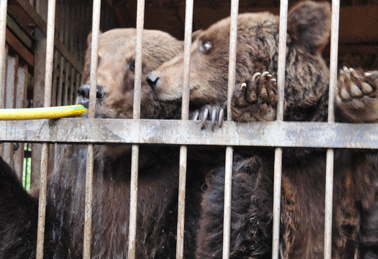
Stopping animal abuse starts with individual animals - the dog shot while living on the streets, the cat forced to scavenge from dumpsters, and the monkey displayed in a tiny cage in a pet shop. At the same time, stopping abuse starts with some of the most important international conventions.
Animals Lebanon was invited by the Ministry of Agriculture to attend a meeting in Qatar between the Minister of Agriculture, HE Dr. Hussein Al-Hajj Hassan, and Mr. Willem Wijnstekers, the Secretary-General of CITES.
The 15th Conference of the the Parties of CITES, one of the main international conventions protecting endangered species, is being held in Doha, Qatar, from March 13 to 25. Taking place only once every three years, this is the first time the Conference has been held in the Middle East.
More than 175 countries that are part of CITES are meeting over the next two weeks, and the Ministry took this opportunity to express their strong intention of having Lebanon join.
"The case of the circus, and the trade of the lions and tigers, highlighted the urgent need to have Lebanon join CITES and protect these endangered species," said HE Dr. Hussein Al-Hajj Hassen.
"It was impressive to be an integral part of a meeting that has the potential to change the course of animal welfare in Lebanon," said Lana El-Khalil, the President of Animals Lebanon. "The Minister made it clear to the Secretary General of CITES that he has every intention of having Lebanon join CITES within one year, and that he is pleased to have groups such as Animals Lebanon help accelerate the process."
As the vast majority of countries are part of CITES, countries which are not part of the convention are often used as hubs for illegal trade of endangered wildlife. By joining CITES Lebanon will have a framework in which to regulate the trade, and more crucially, to take decisive action when animals are not moved in compliance with CITES.
Mr. Wijnstekers stressed "it is necessary when drafting legislation to ensure that there are adequate forms of punishment to prevent non compliance with CITES." In many countries the penalties are so minimal that they do not act as any form of deterrent. Smugglers, if punished, can just consider the penalties as 'part of doing business' and not something which will stop illegal trade.
"The most important aspect is to keep in mind the spirit of the convention," continued Lana. "CITES was developed based on the need to protect so many species which are now endangered, and to ensure that the trade in these animals does not harm the survival of the species or compromise the welfare of the animals while being traded internationally."
Over the last few years Animals Lebanon has done a great deal of work exposing the smuggling of highly endangered animals and the need to join CITES. Chimpanzees are used as roadside attractions, pet shops sell a range of illegal animals, and many animals end up as part of zoos. Many of these animals are taken from the wild with no regard for the welfare of the individual animal or the species as a whole. CITES will not only protect animals from other countries which are brought to Lebanon, but will help protect the wildlife of Lebanon.
"This is an initiative the country needs to get behind and support. Joining CITES is more than being part of an international accord - it is a historic initiative to position Lebanon with the rest of the nations that recognize the importance of protecting its environment and wildlife. We are proud to be playing an integral role in bringing Lebanon in line with international standards," concluded Lana.
